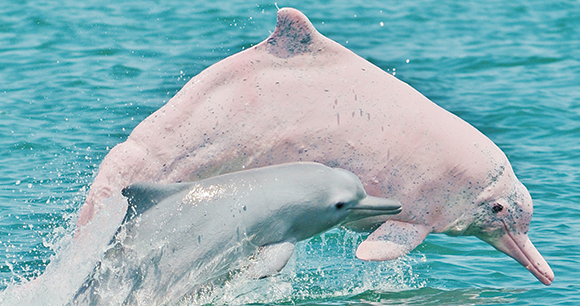
Critically Imperiled Dolphin Needs Immediate Safeguards, International Cooperation
Washington, DC—The National Marine Fisheries Service today proposed listing the Taiwanese humpback dolphin (also known as the Taiwanese white dolphin), Sousa chinensis taiwanensis, as endangered, determining that the subspecies has a high risk of extinction throughout its restricted range. The decision comes in response to a March 2016 petition submitted by the Animal Welfare Institute, the Center for Biological Diversity and WildEarth Guardians seeking federal protections to help prevent the extinction of a population that now numbers fewer than 75 individuals.
“This proposed rule is a major victory for the Taiwanese white dolphin,” said Dr. Naomi Rose, Animal Welfare Institute marine mammal scientist. “We applaud the US for taking this significant step toward recognizing the plight of this subspecies, which is on the brink of extinction. Even though the subspecies exists solely in Taiwanese waters, this listing will promote stronger protection for the population by Taiwanese authorities, hopefully in cooperation with US input.”
Taiwanese humpback dolphins are threatened by gillnet fishing, pollution, boat traffic, and development along Taiwan’s densely populated west coast, including the proposed construction of large wind farms. An endangered listing would enable the US to provide technical expertise and resources to support Taiwan in conserving the dolphin. The Endangered Species Act has proven to be an effective safety net for imperiled species—extinction has been prevented for more than 98 percent of the animals under its care.
“These rare dolphins need protection if they’re going to survive. Small cetaceans like the white dolphin of Taiwan or the vaquita in Mexico will disappear forever if we don’t work together to save them,” said Abel Valdivia, an ocean scientist with the Center for Biological Diversity. “The US action recognizes that international cooperation is needed to save certain species from extinction.”
The Taiwanese humpback dolphin, also known in Taiwan as Matsu’s fish, is a biologically and culturally important subspecies of Indo-Pacific humpback dolphin. In 2014 the Service denied a previous petition to protect the Taiwanese humpback dolphin, concluding that the population was not distinct from the Chinese white dolphin, which swims in shallow waters closer to China’s coastline, and separated by the deeper waters of the Taiwan Strait. More recent taxonomic studies determined that the Taiwanese humpback dolphin is a distinct subspecies with unique characteristics and is geographically isolated from its Chinese cousins.
“Today’s decision is an important step in preventing the extinction of this critically imperiled dolphin and getting it on the road to recovery,” said Bethany Cotton, wildlife program director for WildEarth Guardians. “We urge the Fisheries Service to quickly finalize these essential protections and work with our Taiwanese allies to address the serious threats to the dolphin’s survival and recovery.”
An estimated 50-80 percent of all life on earth is found in the oceans. More than half of marine species may be at risk of extinction by 2100 without significant conservation efforts. Despite this grave situation, the US largely fails to protect marine species under the ESA.
To view the proposed rule, visit https://www.federalregister.gov/documents/2017/06/26/2017-13250/endangered-and-threatened-wildlife-and-plants-proposed-endangered-listing-determination-for-the. It is now open for public comment, until August 25.
Amey Owen, (202) 446-2128, [email protected]
About the Animal Welfare Institute
The Animal Welfare Institute (www.awionline.org) is a nonprofit charitable organization founded in 1951 and dedicated to reducing animal suffering caused by people. AWI engages policymakers, scientists, industry, and the public to achieve better treatment of animals everywhere – in the laboratory, on the farm, in commerce, at home, and in the wild. For more information, visit www.awionline.org.
About the Center for Biological Diversity
The Center for Biological Diversity is a national, nonprofit conservation organization with more than 1.3 million members and online activists dedicated to the protection of endangered species and wild places.
About WildEarth Guardians
WildEarth Guardians is a nonprofit conservation organization dedicated to protecting and restoring the wildlife, wild places, wild rivers, and health of the American West. Guardians is working toward Endangered Species Act protections for imperiled marine species through its Wild Oceans campaign.